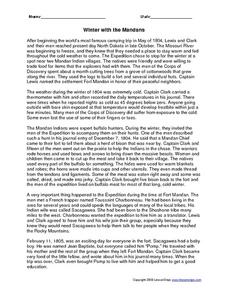Curated OER
International Curiosity and National Pride
Students look at their own culture and at Bulgarian culture to identify national, local, or ethnic traits. They identify at least three important characteristics of their culture that help make it unique and compose a list of questions...
Curated OER
Serious Doodling
Students examine cartoons drawn by a volunteer serving in the country of Jordan. They draw a cartoon about a time felt different from others around them and share their cartoons with the class. The answer the questions: How can cartoons...
Curated OER
Narrative Cartoons
Young scholars compare and contrast the traditional superhero cartoon with a narrative cartoon. Students research water resources and usage in Africa and create original narrative cartoons showcasing their findings.
Curated OER
Seeing Both Sides of an Issue
Students develop arguments on both sides of an issue to see how it feels to understand opposing views. They try to think of all the reasons they might take the opposite position on the same statement: My way of doing things is the best...
Curated OER
A Morning of Weighing Babies
Students read sections of "A Morning of Weighing Babies". Individually, they write a paragraph examining the main characters and their actions. After sharing a few writings, they discuss the relationship between the author and the...
Curated OER
The Death of Old Woman Kelema
Students read various parts of "The Death of Old Woman Kelema". Next, they listen to the author's description of her writing process. In groups, they compare and contrast funerals in Mali with those in the United States. They also...
Curated OER
Beauty
Students bring an object to school that is of significant sentimental value to them. They arrange the objects in a class display, examine each other's artifacts and discuss the implications and cultural bias of the word 'beauty'.
Curated OER
Opposites
Students choose a category to discuss and write down the name of an activity that represents the various characteristics. They record their responses on a class sheet and discuss how it feels when someone disagrees with them. They...
Curated OER
First Impressions
Students discuss the importance of not making assumptions when only little information is known. With a partner, they complete a worksheet in which they only look at them to figure out what they like, etc. Next, they ask them the...
Curated OER
The Third Question
Students reflect upon the rewards of providing services to others, and whether by giving they might perhaps be gaining at the same time. They explain how or why Knowing a foreign language can help people make new friends and build a new...
Curated OER
Beauty
Students share what they think of when they hear the word beautiful. Individually, they bring in an object they believe is beautiful based on its relationship to a person, idea or event. They view each others object and write down...
Curated OER
Brief Encounters (Looking at Ourselves and Others)
High schoolers participate in a simulation in which they examine how different cultures interact with one another. In groups, they follow the behaviors for their specific group while a group of observers records their interactions. To...
Curated OER
Just Like the Old Days
Students examine and experience roles and customs of rural Mongolians through role-playing, and they will compare unfamiliar roles from Mongolia with everyday roles in the United States. the will chart their own families and then predict...
Peace Corps
Introducing Culture
Growing up within a culture leaves a lot of ideas and values unspoken. Take a closer look at the cultures in which your learners live with a discussion activity that addresses cultural identity and traits of those living within the...
Facing History and Ourselves
American Idealist: What Is an Idealist?
Students explore the concept of idealism. In this Sargent Shriver instructional activity, students watch segments of "American Idealist" and discuss the attributes of Shriver and of idealist thinking.
Curated OER
What Is Culture
Fourth graders investigate the concept of culture. They look into the influences that shape culture and how it effects people and regional areas. Students answer the question of why it is important to study culture to have a better...
Curated OER
International Volunteer Day
In this international volunteer day instructional activity, students read or listen to the passage, then match phrases, fill in the blanks, choose the correct words, unscramble words and sentences, put sentences in order, write...
Curated OER
Truth, Trash and Treasure
Students investigate how democracy in the United States makes civic virtue possible. They examine the rights and responsibilities associated with democracy. In small groups, they create public service posters that highlight these ideas.
Curated OER
Winter with the Mandans
In this Lewis and Clark's winter with the Mandans instructional activity, learners read for information and assess comprehension. In this matching, essay, and multiple choice instructional activity, students answer fourteen questions.
Curated OER
President Jefferson's Cipher: Cracking the Code
Students examine the journey out west by Lewis and Clark. Using a cipher from President Jefferson, they solve a code he gave to the explorers before setting out on their exploration. They share his message with the class and state...
Peace Corps
Peace Corps: Narrative Cartoons
Using the communicative means of cartooning, learners examine essays from various Peace Corps volunteers and recount them by writing their own cartoons.
Peace Corps
Peace Corps: Lesson Plan: Recognizing How Another Culture Differs From One's Own
After experiencing time in Guinea, a Peace Corps volunteer shares the cultural differences of punctuality and concepts of time in this lesson plan.
Peace Corps
Peace Corps: Defining Culture
Online lesson plan for facilitating student exploration of culture and how culture shapes the individual.
Peace Corps
Peace Corps: A Togolese Tale: The Big Fire
Through this lesson learners will come to appreciate how folk tales express the culture in which they were derived through the writing.























